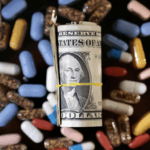
President Donald Trump sent letters to the leaders of 17 major pharmaceutical companies outlining how they should slash U.S. prescription drug prices to match those paid overseas, the White House said on Thursday.
Trump signed a sweeping executive order in May demanding drugmakers cut U.S. medicine prices to match those abroad, saying that if companies did not comply, the government could use rulemaking to bring prices down or pursue other measures, such as importing cheaper medicines from overseas.
Trump sent the letters to the chief executives of Eli Lilly, Sanofi, Regeneron, Merck & Co, Johnson & Johnson, and AstraZeneca, among others, the White House said.
“Most proposals my Administration has received to ‘resolve’ this critical issue promised more of the same; shifting blame and requesting policy changes that would result in billions of dollars in handouts to industry,” Trump wrote in the letters, copies of which were posted on his Truth Social account.
Shares of Pfizer, Eli Lilly and Gilead Sciences closed down about 2% each, while the NYSE Arca Pharmaceutical Index fell 3% on Thursday.
Trump called on drugmakers to provide so-called most-favored-nation prices to every patient enrolled in the government Medicaid health program for low-income people, and to guarantee such pricing for new drugs.
The policy is aimed at cutting U.S. prescription drug prices to the lowest possible price paid by members of the Organisation for Economic Co-operation and Development, which includes most of the world’s largest economies.
Trump also said companies must return excess overseas revenue from raising prices in other countries to offset lower prices in the U.S. to American patients and taxpayers through an agreement with the government.
He is requiring drugmakers to stipulate they would not offer other developed nations better prices than what they offer the United States, and said his administration would provide ways to cut out middlemen and sell directly to patients, provided they do so at most-favoured-nation prices.
Trump gave companies until September 29 to respond with binding commitments to those terms.
“If you refuse to step up, we will deploy every tool in our arsenal to protect Americans from abusive drug pricing practices,” he warned.
Analysts, lobbyists and drug pricing experts said it seemed unlikely that the pharmaceutical companies would comply with Trump’s demand to lower U.S. prices.
“I might expect them to try to determine if any of their current products might be made available via direct sales (one of the requests) at a lower price than currently available in the U.S.,” said Stacie Dusetzina, professor of health policy at Nashville’s Vanderbilt University.
UBS analyst Trung Huynh said Trump’s letters were a repeat of earlier demands and played down any likely industry impact, calling it “just another shot in the dark.”
Trump has already pushed for voluntary changes, and some companies have pledged to build new U.S. manufacturing plants.
U.S. patients pay by far the most for prescription medicines, often nearly three times more than in other developed nations. The country also invests heavily in pharmaceutical research and development. Drugmakers have said drastic price cuts would stifle innovation.
Pharmaceutical companies, including Pfizer, Novartis, AbbVie, and German Merck KGaA’s U.S. division, EMD Serono, said they were open to working with the Trump administration.
Pfizer is working closely with the Trump Administration and Congress to improve access and affordability for American patients, said spokeswoman Amy Rose. “Our discussions have been productive,” she said.
- President Commissions 36.5 Million Dollars Hospital In The Tain District
- You Will Not Go Free For Killing An Hard Working MP – Akufo-Addo To MP’s Killer
- I Will Lead You To Victory – Ato Forson Assures NDC Supporters
Visit Our Social Media for More




